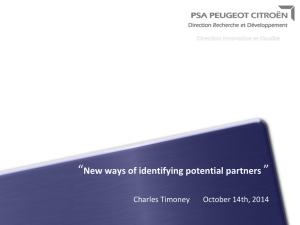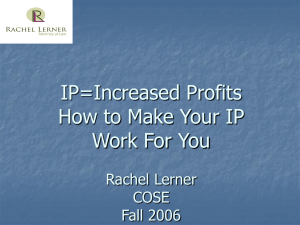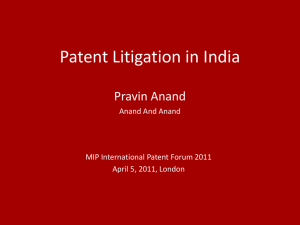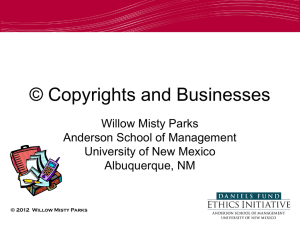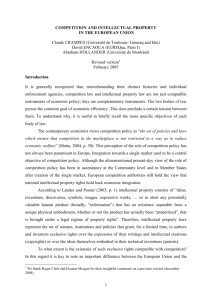Competition Law Defenses to Patent Infringement in Germany
advertisement
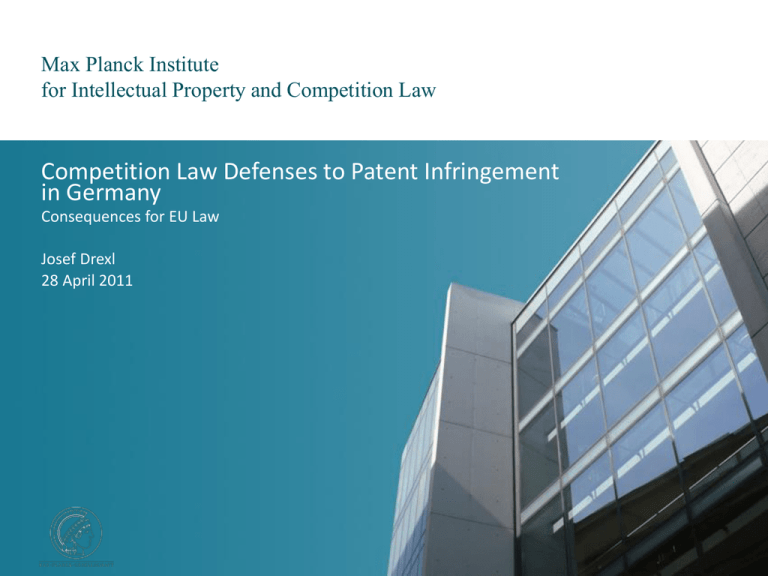
Max Planck Institute for Intellectual Property and Competition Law Competition Law Defenses to Patent Infringement in Germany Consequences for EU Law Josef Drexl 28 April 2011 Max Planck Institute for Intellectual Property and Competition Law Name / Date 1 Refusal to License as a violation of Art. 102 TFEU Volvo v Meng (ECJ, 1988) – design protection Magill (ECJ, 1995) – copyright IMS Health (ECJ, 2004) – copyright Microsoft (CFI, 2007) – trade secrets 4 cumulative requirements: (1) Indispensablity of access (2) Exclusion of “effective” competition (3) Prevention of the emergence of a new product (including limitation of technological progress) (4) No objective justification “incentives balancing approach” Max Planck Institute for Intellectual Property and Competition Law Name / Date 2 Patent Infringement Proceedings in Germany Why is Germany so important in patent infringement proceedings? Germany as the economically most important national market within EU Jurisdiction: According to EU rules, any alleged infringer may be sued in Germany for patent infringement in Germany Quality of the courts (in particular: Düsseldorf, Mannheim), relatively cheap and quick Parties tend to settle the case for the whole of Europe based on decision for Germany Max Planck Institute for Intellectual Property and Competition Law Name / Date 3 Patent Infringement Proceedings in Germany Why is the competition defense in German infringement proceedings? The “three-step-step test” of patent infringement defenses (1) No use of the patent (2) Invalidity of the patent (not available in Germany; “separation principle”) (3) Duty to license (e.g., as a matter of competition law) The role of German competition law (1) Parallel application of EU and German competition law (2) Regulation 1/2003: In the field of unilateral conduct, nationals law may prohibit what is allowed under EU law German courts not bound by EU case law on refusal to license Max Planck Institute for Intellectual Property and Competition Law Name / Date 4 Refusal to license under German competition law German Federal Supreme Court: Standard-Spundfass (2004) See: 36 Int’l Rev. Intell. Prop. & Comp. L. 741 (2005) Sec. 20(1) Act against Restraints of Competition: “Discrimination” Case on standardized (SSO) technology (essential patents) Court did not apply “new product rule” It is the standard, not the technological superiority of the invention that attributed the whole market to the patent holder Note: (1) Case limited to standards (maybe even SSO standards) (2) Duty to license may also apply without discrimination Max Planck Institute for Intellectual Property and Competition Law Name / Date 5 Refusal to license under German competition law: Orange Book Standard (Federal Supreme Court 2009) See: 41 Int’l Rev. Intell. Prop. & Comp. L. 369 (2010) Orange Book Standard: Standard for the production of rewritable compact disks What are the procedural requirements for being allowed to use the standard without a license agreement? (1) General principle of good faith in Germany: Plaintiff is prevented from claiming from a defendant if he would have to give back immediately based on a plaintiff’s claim (injunction duty to deal) (2) Court: Plaintiff has to act in good faith (as a faithful licensee) Has to submit an unconditional application for the license before use Must not question the validity of the patent Has to act according to reasonable licensing conditions and has to deposit reasonable royalty fees For a critique see: Hanns Ullrich, 41 Int’l Rev. Intell. Prop. & Comp. L. 337 (2010) Max Planck Institute for Intellectual Property and Competition Law Name / Date 6 Issues for debate The IP/Competition Law Interface: o Does Orange Book Standard limit other defenses too much? o Will defendants ever be able to rely on competition law after Orange Book Standard? The EU Dimension: o What kind of procedure does EU law require in case of a duty to license? o What if also Art. 102 TFEU is violated: Does Orange Book Standard provide for effective enforcement of EU competition law? Comparison with the US: o US antitrust law will hardly ever support a duty to license o But: How close is the German case law to the US eBay rule on injunctive relief? Max Planck Institute for Intellectual Property and Competition Law Name / Date 7 Thank you! Max Planck Institute for Intellectual Property and Competition Law Name / Date 8




